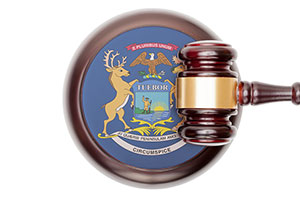A defense challenge to the use of a mechanic as an expert witness to discredit the defendant’s claim that his brake line failed was rejected by the Michigan Court of Appeals. The court held that the mechanic’s testimony satisfied Michigan’s version of the Daubert standard.
Facts of the Case
Dalton Carll was 17 and a novice driver when he crashed a pickup truck on a gravel road. Two of his friends were riding in the truck bed and four other friends were inside the passenger area. Carll went through a stop sign and struck a car that was entering the intersection. The driver of that car was killed and his passenger was injured. The two people riding in Carll’s truck bed were also injured.
A passenger in Carll’s truck testified that he was driving at 30 to 40 mph when he reached the stop sign. Carll testified that he tried to stop but the truck failed to respond when he applied the brakes. Carll supported his defense with evidence that a post-accident inspection of his truck determined that the brake line was broken.
Carll was convicted of causing death by reckless driving and three counts of causing injury by reckless driving. On appeal, Carll contended that the prosecution’s expert witness should not have been allowed to testify.
Expert Testimony
Carll testified that he was driving at 20 to 30 mph when he approached the stop sign. He testified that the brakes had been “spongy” but responsive until he reached the stop sign, when they failed to stop the truck.
Greg Bittner, who owned and operated a local auto repair shop, testified as an expert for the prosecution. Bittner inspected the truck after the accident and determined that it had a broken brake line. He testified that, in his opinion, the brake line came apart during the accident but was functioning before the accident.
Bittner based his opinion on his observation that the brake line was “cleanly cut” at the point where the cab and the frame had bent into the line. The frame damage was caused by the accident. He saw no evidence of wear or corrosion that would cause a brake line failure.
Bittner also testified that the front brakes operated on a separate line and that Carll should have had some braking power from the front brakes even if the brake line to the rear brakes had broken. Bittner inspected all rotors, calipers, and pads and found nothing that would prevent the brakes from functioning.
Appellate Ruling
Carll argued on appeal that Bittner should not have been allowed to testify as an expert. The court of appeals affirmed the trial court’s conclusion that Bittner was qualified to render an expert opinion. He is state certified as a brake mechanic and has 15 years of experience testing, maintaining, and repairing brake systems. That experience was sufficient to qualify him as an expert in brakes.
Following the Daubert formula of expert opinion admissibility, Michigan requires the trial judge to determine that the expert based opinions on adequate facts, used reliable principles and methods to form opinions, and reliably applied those methods to the facts. The defense made a general challenge to Bittner’s methodology as unreliable.
The court of appeals was satisfied that Bittner’s testimony “rested on a reasonable analysis.” Bittner gathered relevant facts by inspecting the components of the braking system. He explained how hydraulic brakes work and how the front brakes should have worked even if the brake line to the rear brakes was severed before the accident.
Bittner testified about the reasons why brake lines fail and the evidence of failure that he has seen (including corrosion and rust) during his years of repairing defective brakes. He reasonably concluded that the absence of such evidence indicated that the brakes did not fail before the accident. His observations of the bent frame in the vicinity of the brake line supported a reasonable hypothesis that the brake line severed during, not before, the accident. Consequently, Bittner was able to form a reasonable opinion about the most likely cause of the broken brake line.




